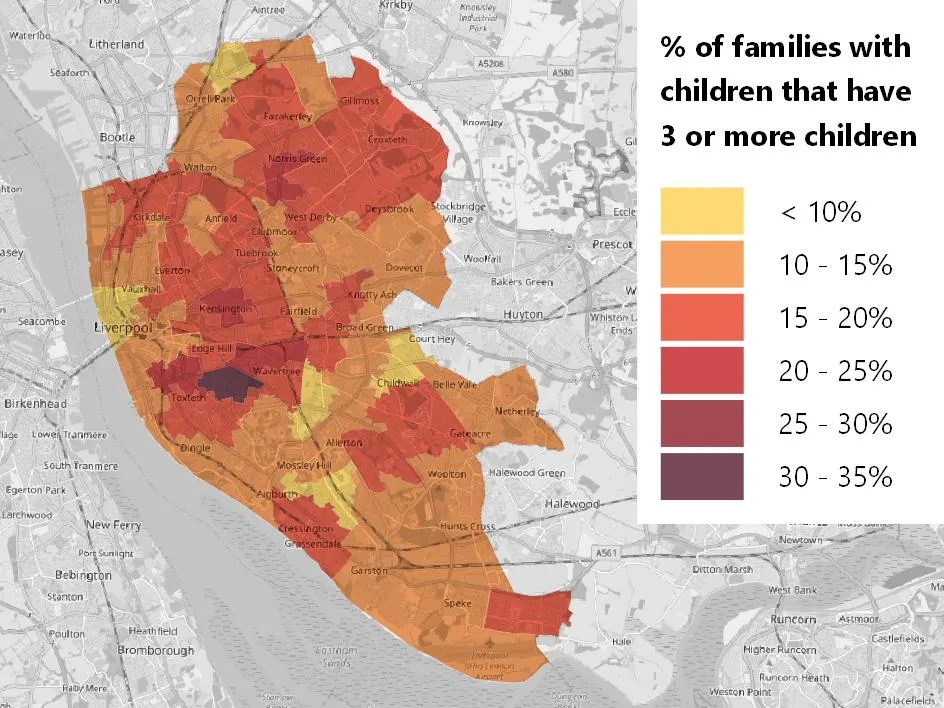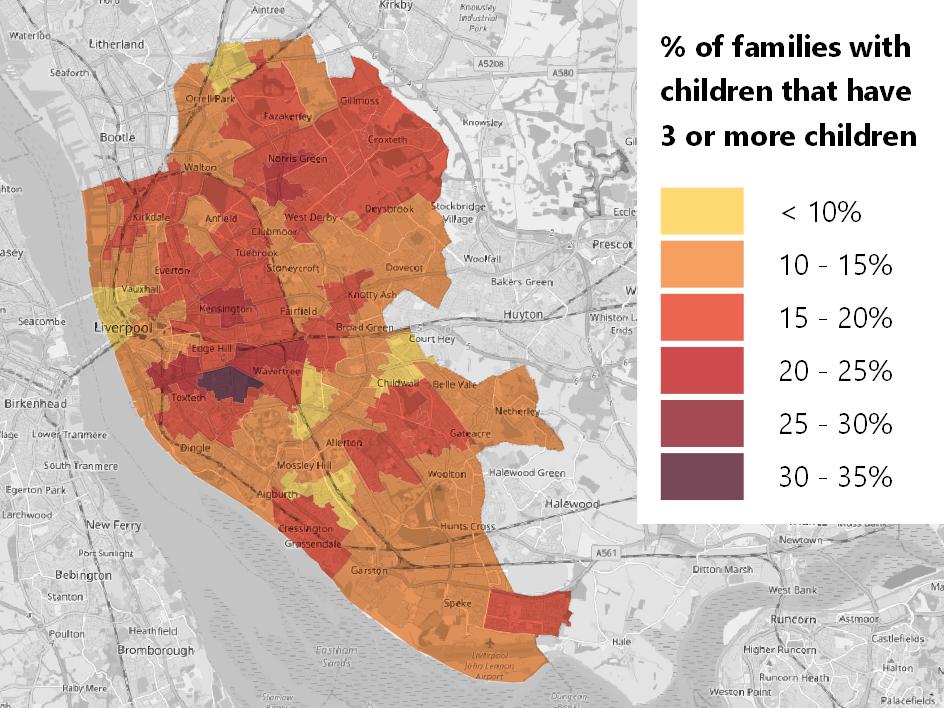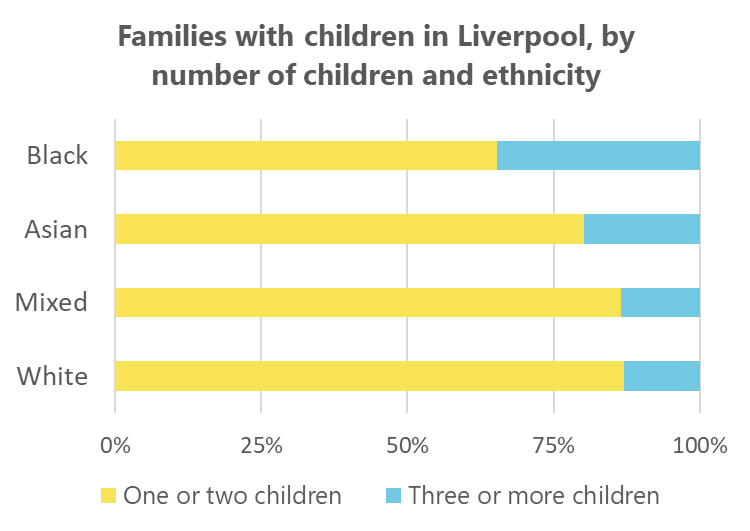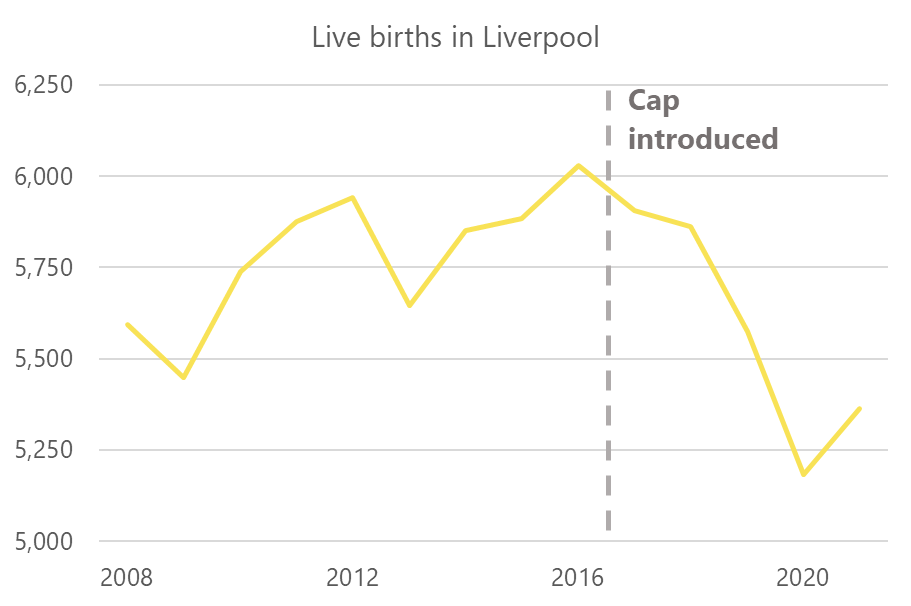Time to scrap the cap? New Post analysis reveals the impact of the two child benefit limit in Liverpool

Labour says it won’t scrap the controversial policy in government. But across Merseyside, its impact on families is enormous
Dear readers — we hope your Pride-induced hangovers are starting to abate, and you all had a wonderful (and colourful) weekend. Thousands marched through the streets of Liverpool for KyivPride on behalf of our Ukrainian friends, continuing a relationship established through Eurovision. There were too many amazing outfits to choose a standout, but rainbow-adorned dogs are always a hit. Exhibit A:

Today’s edition focuses on the two child benefit cap, a controversial national policy which affects one in 10 children in the UK, limiting the amount of benefits families can receive. To the disappointment of many on the left, Labour have said that if they form a government next year, they won’t scrap the policy as they were expected to. New analysis by the The Post — carried out by our data expert Daniel Timms — makes the full effect of the cap across Merseyside very clear, including its disproportionate impact in north Liverpool.
Our weekend read took a deep dive into the world of Nazi U-boats and WW2 submarines, and asked: for a city with such a storied maritime history, where are all our ships? Apparently, ship preservation is no mean feat (“The first rule of conserving a historic ship is: just don’t” were the words of one expert in the field) but not everyone was so discouraging. Do keep the comments coming, they are — as ever — one of the best things about The Post.
Last week paying members received two fantastic, and very different, editions. Tuesday saw Abi hanging out with a flora-phile par excellence, Liverpool’s King of Flowers Joshua Styles, as he laid out his mission to revive local biodiversity. And that nice, sunny edition was followed up on Thursday as Jack met the protestors outside Town Hall who believe Liverpool is being used as a “guinea pig” for a sinister Satanic plot. Here’s a taster:
“What are the council plans in service of, I ask? ‘You wouldn’t believe me if I told you,’ Paul replies. Try me. ‘It’s a global Satanic plot to destroy everything created in God’s image,’ Paul explains. But why? “Because they’re Satanists. They worship Lucifer, Belial, whatever you want to call it.’”
Editor’s note: We’re just one away from our monthly target of 75 new members. If you enjoy the work we produce and haven’t yet signed up as a paying member, help us scramble over the July finish line and in return, we’ll send you 16 packed-out editions every month; full of investigations, exclusives, great cultural recommendations and much more. Not only that, you’ll be part of our mission to restore local journalism to its former glory; clickbait-free, highly researched work of a quality our city deserves. All for £1.25 a week. Hit that button.
This week’s weather
Monday ⛈️ Thundery showers and a moderate breeze with highs of 18°C
Tuesday 🌦️ Light rain showers and a moderate breeze with highs of 18°C
Wednesday 🌦️ Light rain showers and a moderate breeze with highs of 17°C
Thursday ⛈️ Thundery showers and a moderate breeze with highs of 18°C
Friday 🌦️ Light rain showers and a moderate breeze with highs of 17°C
Weekend ⛈️ Thundery showers and a gentle breeze with highs of 18°C
This week’s weather forecast is sourced from BBC Weather and it’s for Liverpool.
Want to make your home greener?

From today’s sponsor: With energy bills skyrocketing, many of us have been wondering about eco options like solar panels, batteries and heat pumps. But will those investments be worth it, and how much will they contribute to saving the planet? That’s where MakeMyHouseGreen comes in — a brilliant tool that lets you put in your postcode in order to see the impact of different green products on your wallet and your carbon footprint. The site is run by a Post reader, and its sophisticated model uses solar intensity data for your postcode and combines it with property and product data to model your savings with 96% accuracy. It’s free to use — and so are the consultation calls with the company’s green energy gurus. Click here now to try it out.
Big thanks to MakeMyHouseGreen for sponsoring today’s edition. Sponsorships are a key way for us to help to fund our operations so we can keep producing lots of free-to-read journalism. If you would like to support The Post’s journalism by sponsoring one of our newsletters and reaching our audience of 16,550 lovely readers, please get in touch.
The Big Story: New Post analysis reveals the impact of the two-child benefit cap in Liverpool
Top line: The “two-child limit” on benefits looks likely to stay — but its impact on Liverpool families is far from equal, and it may even be reducing the birth rate, as new data analysis by The Post shows.
The context: The cap was introduced in 2017 by then-chancellor George Osborne as part of the government’s austerity programme. Many expected the Labour Party to scrap it if they come to power, Sir Keir Starmer and many shadow cabinet members having spoken against it in strong terms. But the party has now opted to keep the cap, saying it’s a “tough decision” that has to be made given the economic circumstances.
It’s important to note that the cap only applies to claims to Child Tax Credit and Universal Credit. These benefits can’t be claimed on a third child born after April 2017. Child Benefit, however, is different. This is the weekly allowance paid for each child and is payable for any amount of children in a family.
The impact in Liverpool is far from evenly spread. In the poorer north of the city, more families tend to have over three or more children. Toxteth, however, in the city’s south, is the area with the highest rate, where around a third of families with children have three or more. Families tend to be smaller in the City Centre and Childwall, where fewer than 10% of families with children have three or more kids.

The policy hits some ethnic groups harder. Among Black families in Liverpool with children, one in three have more than two children. In Asian families, it’s around one in five, and in White families it’s closer to one in eight.

The cap may also be reducing the number of children born in the city. Since its introduction in 2017 the number of births has dropped quite sharply. The unusually low figure for 2020 probably also incorporates some of the pandemic impact, but 2021 saw births remain very low as well. As the cost of living crisis bites, people are likely to put off having children or decide not to have them all together.

While the cap saves the Government money in the short term, it’s debatable whether it makes economic sense in the long term. “Demographics are destiny”, as the old saying goes — and with fewer people of working age, the future tax base to fund public services will be diminished. Like many developed countries, the UK is struggling with the challenges of an ageing population — and the cap is likely to intensify these problems.
And there’s a strong moral argument for scrapping the cap. Children have no choice about the size of the family they’re born into — yet if it’s larger, they’re much more likely to find themselves in poverty. Research commissioned by the charity End Child Poverty has found that children in households with three or more children are in some cases almost twice as likely to be impoverished as those growing up in one or two child families.
Bottom line: The Post believes that the two-child benefit cap is damaging for Liverpool, with a particularly negative impact on its poor and on its Black population. The data we’ve examined makes a strong argument that it should be scrapped.
Ammendment: This article was edited on 14/08/2023 to clarify that while Universal Credit and Child Tax Credit are capped at two children per family, Child Benefit is not and is payable to any and all child in a family.
Your Post briefing
Thousands of people marched through Liverpool this weekend as the city hosted Pride on behalf of Ukraine. Marches were banned in Ukraine after the Russian invasion last year, so Liverpool City Region Pride Foundation stepped in and promised to host KyivPride. “LGBT+ people are a global community,” Andi Herring, head of Liverpool City Region Pride Foundation, told the BBC. “That’s why it is crucial that we ‘shout it loud’ in solidarity with LGBT+ people across the world.”
The English National Opera (ENO) has delayed its move out of London after receiving an additional grant of £24 million from Arts Council England. Earlier this year, ENO were told they would have to move outside of London to qualify for future grants, with Liverpool on the cards as their new home alongside Manchester and Birmingham. But after the proposal sparked mass anger down in the capital (“cultural vandalism” declared Melvyn Bragg), ENO will be staying put in London until 2029. They will, however, begin to host events before the move in whichever new city is selected. If Liverpool’s plan is to house ENO in a new venue, like the new Liverpool Music centre at Canning Place, then an extra three years to get our ducks in a row would come in handy. You’ll find more details in Jack’s recent piece about Liverpool’s fight to become the new home for ENO.
Concerns have been raised about the mental health support provided in Liverpool’s prisons after several inmates committed suicide in July. Three prisoners died between July 12th and 21st from what are believed to be self-inflicted injuries, with each death now being investigated by the coroner. This comes after new data published by the Ministry of Justice revealed suicides in prisons are up 26% annually, with the Prison Officers Association (POA) partly attributing the mental health crisis to the longstanding impact of the pandemic. If you’ve got any infomation on this story, or have been affected by it, please email editor@livpost.co.uk.
A man has been arrested on suspicion of murder after a 19-year-old man from Liverpool was stabbed over the weekend. Matthew Daulby was attacked in Ormskirk on Saturday night, and later died in hospital from his injuries. A 20-year-old man remains in custody in connection with the incident, with two 19-year-olds — one from Liverpool and one from Melling — also arrested on suspicion of affray.
Post Picks
☕ Enjoy a yoga session this Sunday at Duke Street Market, with a freshly brewed coffee and pastries (!) waiting for you at the end of the class. The event is hosted by Vinyasa Yoga, and begins at 10.30am. Find out more here.
🎸 Penny Lane Festival returns this weekend with three days of live music and DJs from Liverpool and beyond. The festival is held at Fogherty’s Bar, with playlists of some of the acts performing available here. Find out more about the festival here.
🎥 For Liverpool Biennial 2023, FACT is hosting a double bill screening from award-winning actor and director Campbell X. Watch both Visible and Still We Thrive this Friday, followed by a Q&A with Liverpool Biennial 2023 Curator Khanyisile Mbongwa. Find out more here.
🎵 Pop star Anne Marie heads to the Cavern Club on Thursday for the launch of her new album, Unhealthy. There are a limited number of tickets available for the show, with the performance starting at 7pm. Find out more here.
Home of the week

This three bedroom semi-detached home in Mossley Hill is on the market for £320,000. The property boasts a large back garden and still has its original wooden floors for a touch of vintage charm. Find out more here.
Our favourite reads
Oppenheimer is the cinematic hit of the summer (well, alongside Barbie) but did you know there was a local connection to the birth of the nuclear bomb? The BBC explores the life of James Chadwick, a man born poor in a Cheshire village and without any kind of academic background, who led the British contingent of the Manhattan Project, the only non-American with access to all of the group’s research. After winning the Nobel Prize in 1935, he became chair of physics at the University of Liverpool, having married in the city, before joining the Project in Los Alamos. Despite saying he felt no guilt at his involvement, he admitted that it took its toll: he ended up taking sleeping tablets every night for 28 years.
A listen (or three) for those with long-read fatigue. The podcasting arm of our good friends over at the South Liverpool Debating Society — The Critical Friend — has gone into overdrive of late, with a trio of in-depth chats with local politicians. There’s council leader Liam Robinson here, Lib Dem leader Carl Cashman here and Nick Small, the council’s growth and economy cabinet member here. It’s rare you get to hear anyone involved in local politics speak at this depth, and all three make for fascinating and insightful conversations.
And finally, not a Liverpool story, nor can we even claim it has a tenuous link to the city, but as it’s written by a former Post contributor and is the funniest thing we’ve read in weeks, why not? Josh Mcloughlin (who wrote April’s definitive guide to Scouseness) goes toe-to-toe with the world’s angriest wannabe academic, for The Fence. Alan Tarcia is a truther of a particular variety, a man who denies William Shakespeare wrote anything attributed to William Shakespeare, and whose belief is so dead-set he spends his days writing furious emails to anyone who refuses to acknowledge his theories. “I hope you look back on this one day, however, and reflect on what a schmuck you are”, is a typical slice of Tarcia correspondence.
Letters from readers
Not to mention the Wincham, the Egremont, rusting next to the bar lightship, or the daffodil.The greatest port city in the world for a hundred years can’t manage to keep one historic vessel, despite millions of tourists every year, ‘SOS: The mission to save Merseyside’s lost maritime heritage’, Paul Vernon
Historically a big complaint from residents of any big city has been having to travel too far to get to a dentist/doctor/school etc etc. Are some people now seriously complaining that those services are going to be too close? A great article, but reading it I didn't know whether to laugh or cry, ‘Liverpool has become the ‘guinea pig’ for a sinister Satanic plot. Or has it?’, Stevo

Comments
Latest
A place in the sun: How do a bankrupt charity boss and his councillor partner afford a “luxury” flat abroad?
Gritty, cheeky, sincere: How Martin Parr captured the spirit of Merseyside
Liverpool’s hospitality scene is changing. So why are we reluctant to shout about it?
Breaking: Councillor Colette Goulding has been suspended
Time to scrap the cap? New Post analysis reveals the impact of the two child benefit limit in Liverpool
Labour says it won’t scrap the controversial policy in government. But across Merseyside, its impact on families is enormous